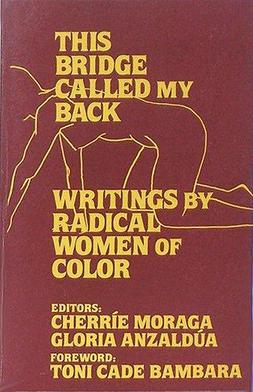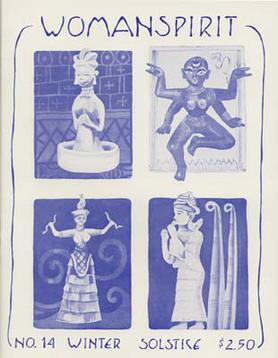Related Research Articles

Lesbian feminism is a cultural movement and critical perspective that encourages women to focus their efforts, attentions, relationships, and activities towards their fellow women rather than men, and often advocates lesbianism as the logical result of feminism. Lesbian feminism was most influential in the 1970s and early 1980s, primarily in North America and Western Europe, but began in the late 1960s and arose out of dissatisfaction with the New Left, the Campaign for Homosexual Equality, sexism within the gay liberation movement, and homophobia within popular women's movements at the time. Many of the supporters of Lesbianism were actually women involved in gay liberation who were tired of the sexism and centering of gay men within the community and lesbian women in the mainstream women's movement who were tired of the homophobia involved in it.
Noreen Stevens is a Canadian cartoonist, who illustrated and wrote the lesbian comic strip The Chosen Family. Her work in the field of comics began in 1984. The Chosen Family is featured in the ensemble comic book Dyke Strippers: Lesbian Cartoonists from A to Z alongside the likes of Diane DiMassa and Alison Bechdel.
Alix Cecil Dobkin was an American folk singer-songwriter, memoirist, and lesbian feminist activist. In 1979, she was the first American lesbian feminist musician to do a European concert tour.

Cherríe Moraga is a Xicana feminist, writer, activist, poet, essayist, and playwright. She is part of the faculty at the University of California, Santa Barbara in the Department of English since 2017, and in 2022 became a distinguished professor. Moraga is also a founding member of the social justice activist group La Red Xicana Indígena, which is network fighting for education, culture rights, and Indigenous Rights. In 2017, she co-founded, with Celia Herrera Rodríguez, Las Maestras Center for Xicana Indigenous Thought, Art, and Social Practice, located on the campus of UC Santa Barbara.
Feminist separatism is the theory that feminist opposition to patriarchy can be achieved through women's separation from men. Much of the theorizing is based in lesbian feminism.

"I've Been Working on the Railroad" is an American folk song. The first published version appeared as "Levee Song" in Carmina Princetonia, a book of Princeton University songs published in 1894. The earliest known recording is by The Shannon Quartet, released by Victor Records in 1923.

Chicana feminism is a sociopolitical movement, theory, and praxis that scrutinizes the historical, cultural, spiritual, educational, and economic intersections impacting Chicanas and the Chicana/o community in the United States. Chicana feminism empowers women to challenge institutionalized social norms and regards anyone a feminist who fights for the end of women's oppression in the community.
Kitchen Table: Women of Color Press was an activist feminist press that was closely related to the National Black Feminist Organization (NBFO) which was started in 1980 following a phone conversation between Barbara Smith and at the suggestion of her friend, poet Audre Lorde. Beverly and Barbara Smith and their associate Demita Frazier together cofounded the Combahee River Collective (CRC). The Kitchen Table: Women of Color Press was most active beginning in 1981, but the Press became inactive soon after Audre Lorde's death in 1992. Smith explains how the motivation for starting a press run by and for women of color was that "as feminist and lesbian of color writers, we knew that we had no options for getting published, except at the mercy or whim of others, whether in the context of alternative or commercial publishing, since both are white-dominated."
Elana Dykewomon was an American lesbian activist, author, editor, and teacher. She was a recipient of the Lambda Literary Award for Lesbian Fiction.
Cheryl L. Clarke is an American lesbian poet, essayist, educator and a Black feminist community activist who continues to dedicate her life to the recognition and advancement of Black and Queer people. Her scholarship focuses on African-American women's literature, black lesbian feminism, and the Black Arts Movement in the United States. For over 40 years, Cheryl Clarke worked at Rutgers, the State University of New Jersey, and maintains a teaching affiliation with the Graduate Faculty of the Department of Women and Gender Studies, though retired. In addition, Clarke serves on the board of the Newark Pride Alliance. She currently lives in Hobart, New York, the Book Village of the Catskills, after having spent much of her life in New Jersey. With her life partner, Barbara Balliet, she is co-owner of Bleinheim Hill Books, a new, used, and rare bookstore in Hobart. Actively involved in her community, Clarke along with her sister Breena Clarke, a novelist, organizes the Hobart Festival of Women Writers each September
The Salsa Soul Sisters, today known as the African Ancestral Lesbians United for Societal Change, is the oldest black lesbian organization in the United States.Operating from 1974 to 1993, the Salsa Soul Sisters identified as lesbians, womanists and women of color, based in New York City Arguments within the Salsa Soul Sisters resulted in the disbanding of the Salsa Soul Sisters into two groups, Las Buenas Amigas made for Latinas, and African Ancestral Lesbians United for Societal Change made for African-diaspora lesbians.

Azalea: A Magazine by Third World Lesbians was a quarterly periodical for Black, Asian, Latina, and Native American lesbians published between 1977 and 1983 by the Salsa Soul Sisters, Third World Wimmin Inc Collective. The Collective also published the Salsa Soul Sisters/Third World Women's Gay-zette.

This Bridge Called My Back: Writings by Radical Women of Color is a feminist anthology edited by Cherríe Moraga and Gloria E. Anzaldúa, first published in 1981 by Persephone Press. The second edition was published in 1983 by Kitchen Table: Women of Color Press. The book's third edition was published by Third Woman Press until 2008, when it went out of print. In 2015, the fourth edition was published by State University of New York Press, Albany.
Julia Penelope was an American linguist, author, and philosopher. She was part of an international movement of critical thinkers on lesbian and feminist issues. A self-described "white, working-class, fat butch dyke who never passed," she started what she called "rabble rousing" when she was a young woman.
Spiderwoman Theater is an Indigenous women's performance troupe that blends traditional art forms with Western theater. Named after Spider Grandmother from Hopi mythology, it is the longest running Indigenous theatre company in the United States.
Third Woman Press (TWP) is a Queer and Feminist of Color publisher forum committed to feminist and queer of color decolonial politics and projects. It was founded in 1979 by Norma Alarcón in Bloomington, Indiana. She aimed to create a new political class surrounding sexuality, race, and gender. Alarcón wrote that "Third Woman is one forum, for the self-definition and the self-invention which is more than reformism, more than revolt. The title Third Woman refers to that pre-ordained reality that we have been born to and continues to live and experience and be a witness to, despite efforts toward change ..."
Queer of color critique is an intersectional framework, grounded in Black feminism, that challenges the single-issue approach to queer theory by analyzing how power dynamics associated race, class, gender expression, sexuality, ability, culture and nationality influence the lived experiences of individuals and groups that hold one or more of these identities. Incorporating the scholarship and writings of Audre Lorde, Gloria Anzaldúa, Kimberlé Crenshaw, Barbara Smith, Cathy Cohen, Brittney Cooper and Charlene A. Carruthers, the queer of color critique asks: what is queer about queer theory if we are analyzing sexuality as if it is removed from other identities? The queer of color critique expands queer politics and challenges queer activists to move out of a "single oppression framework" and incorporate the work and perspectives of differently marginalized identities into their politics, practices and organizations. The Combahee River Collective Statement clearly articulates the intersecting forces of power: "The most general statement of our politics at the present time would be that we are actively committed to struggling against racial, sexual, heterosexual, and class oppression, and see as our particular task the development of integrated analysis and practice based upon the fact that major systems of oppression are interlocking. The synthesis of these oppressions creates the conditions of our lives." Queer of color critique demands that an intersectional lens be applied queer politics and illustrates the limitations and contradictions of queer theory without it. Exercised by activists, organizers, intellectuals, care workers and community members alike, the queer of color critique imagines and builds a world in which all people can thrive as their most authentic selves- without sacrificing any part of their identity.
Womyn's land is an intentional community organised by lesbian separatists to establish counter-cultural, women-centred space, without the presence of men. These lands were the result of a social movement of the same name that developed in the 1970s in the United States, Australia, New Zealand, and western Europe. Many still exist today. Womyn's land-based communities and residents are loosely networked through social media; print publications such as newsletters; Maize: A Lesbian Country Magazine; Lesbian Natural Resources, a not-for-profit organisation that offers grants and resources; and regional and local gatherings.

WomanSpirit was a lesbian feminist quarterly founded by Ruth and Jean Mountaingrove and produced collectively near Wolf Creek, Oregon. It was the first American lesbian/feminist periodical to be dedicated to both feminism and spirituality. Many of the contributors to WomanSpirit were, or became, well known within the women's spirituality movement. It had 40 publications, covering topics such as ecology, goddess myths and rituals, feminist theory, and divination. Its submissions included articles, photos, letters, book reviews, artwork, and songs.
Persephone Press was a publishing company and communications network run by a lesbian-feminist collective in Watertown, Massachusetts. The company published fourteen books between 1976 and 1983, when the organization was sold to Beacon Press.
References
- ↑ Love, Barbara (2006). Feminists Who Changed America, 1963–1975. University of Illinois Press. pp. 322. ISBN 9780252031892.
- ↑ Olsen, Polina (2012). Portland in the 1960s: Stories from the Counterculture. Arcadia Publishing. ISBN 9781609494711.
- ↑ Boffone, Trevor (2016). (Re)mapping the Latina/o Literary Landscape. Springer. p. 180. ISBN 9781349949007.
- ↑ Littlebear Morena, Naomi (December 3, 2012). "Lyr Req: You Can't Kill the Spirit (Naomi Morena)". The Mudcat Cafe.
- 1 2 This Bridge Called My Back: Writings by Radical Women of Color. Kitchen Table: Women of Color Press. 1983. pp. 16, 157. ISBN 9780913175033.
- ↑ Jo, Cochran (1986). Bearing Witness Sobreviviendo: An Anthology of Writing and Art by Native American/Latina Women. Calyx Books. p. 30. ISBN 9780934971027.
- ↑ For Lesbians Only: A Separatist Anthology. Onlywomen Press. 1988. pp. 345–347.